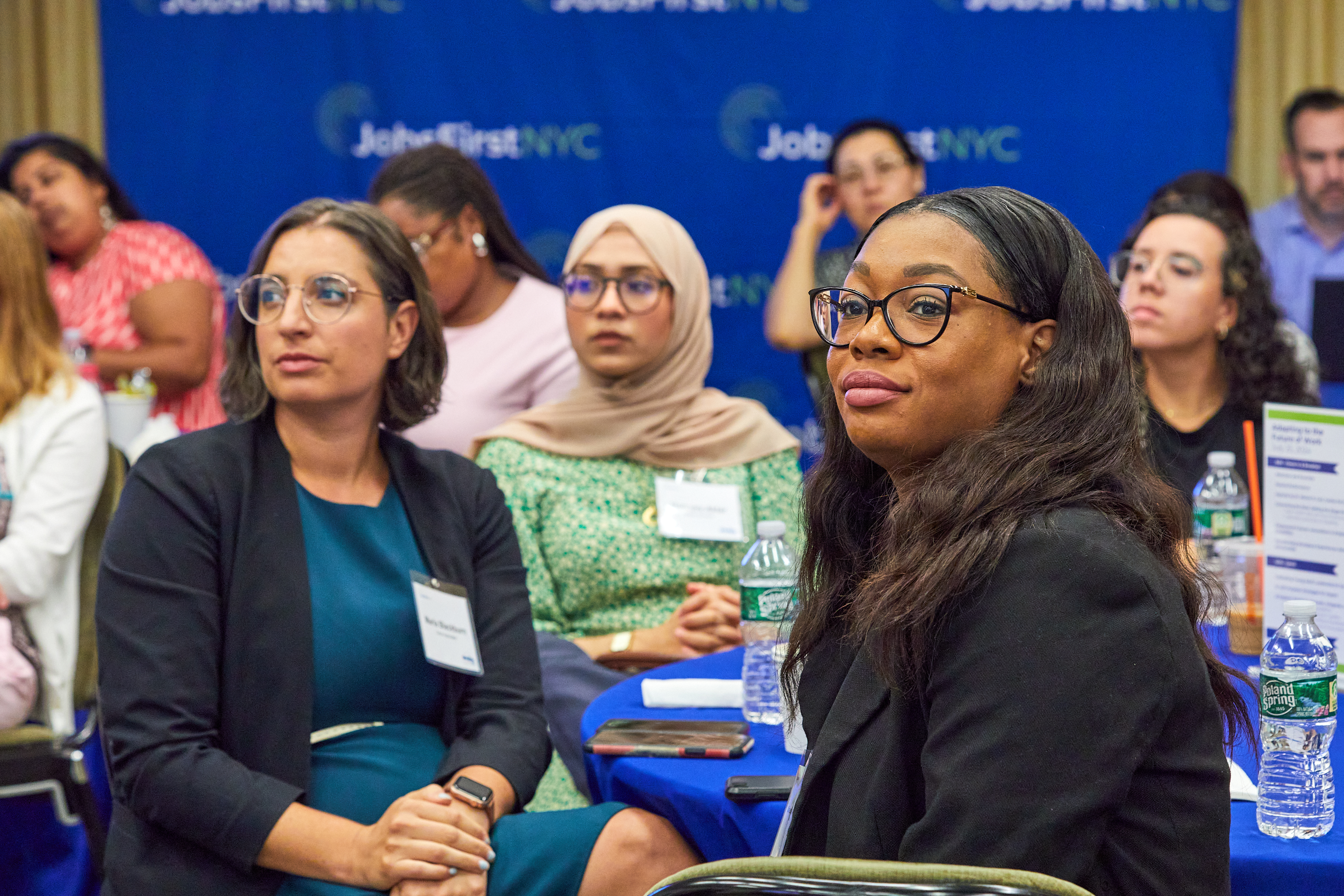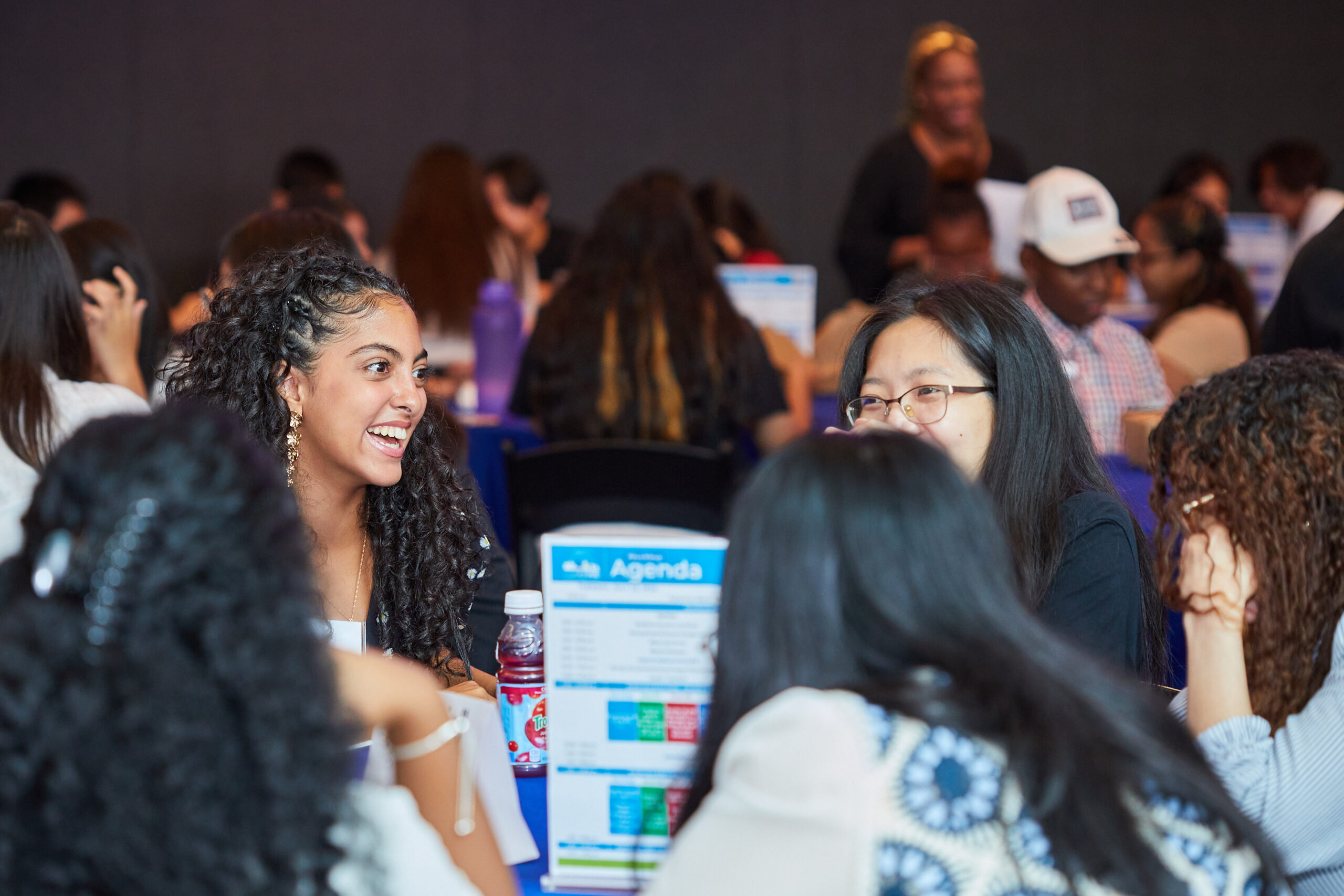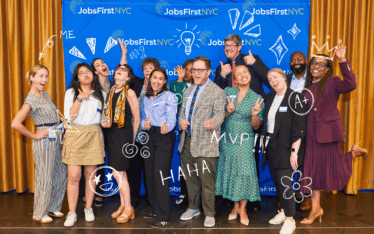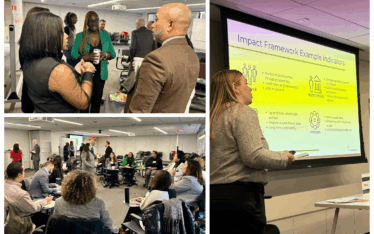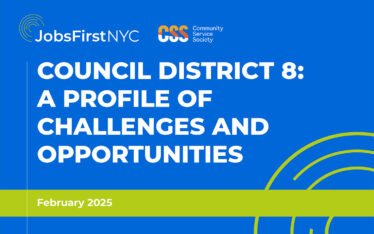With the theme “Buckle Up,” JobsFirstNYC’s latest Adapting to the Future of Work convening set an urgent tone, emphasizing the rapid changes in the workforce development landscape. On July 25, 2024, twenty-five influential visionaries took the stage, determined to reshape the future. Through dynamic panels, data-driven presentations, and interactive breakout sessions, they shared bold strategies to support young adults, their communities, and the institutions serving them as they navigate the evolving economy.

Marjorie Parker, CEO and President of JobsFirstNYC
Partnerships Power Success in Workforce and Education for Young People
“The leaders in this room are building the next generation of workforce and education programs,” declared Marjorie Parker, CEO & President of JobsFirstNYC, as she energized the audience with the opening remarks for the day. She highlighted JobsFirstNYC’s 18-year track record of connecting over 16,000 young people to education, skills training, and jobs. Parker also emphasized the organization’s vast network of over 200 partner institutions across New York City, all working together to transform access to economic opportunities for the city’s young adults.
❛
The leaders in this room are building the next generation of workforce and education programs…the programs that the young people who gathered two days ago will continue to seek out as they work relentlessly to build robust careers and lives
❜
-Marjorie Parker
The audience buzzed as Alan Momeyer, Chairman of the JobsFirstNYC Board of Directors, announced a $4 million donation from philanthropist MacKenzie Scott—an achievement made possible through the tireless efforts of JobsFirstNYC’s partner organizations. He revealed that 60% of the funds will be allocated to strengthening these partnerships over the next three years, ensuring continued support for the transformative work they do.
The opening remarks ended on a high note with a vibrant musical performance by Victoria Standoak, leaving attendees energized and inspired for what lay ahead.
Designing Public Policy Inspired by Equity

Dr. Marvin Carr, Director of Strategic Initiatives of the Center for Racial Equity at Walmart
Dr. Marvin Carr, Director of Strategic Initiatives of the Center for Racial Equity at Walmart Inc., stressed the need to build an intentional ecosystem that offers quality education and opportunities for youth. He recounted his journey to obtaining his college degree, emphasizing how “equity sparks”—random acts of kindness—played a crucial role in his progress.
Dr. Carr further explored the significance of considering marginalized communities in public policy design. He argued that “when we design public policy for those furthest from equity, it benefits everyone.” Connecting back to workforce development, larger trends such as impact hiring can create long-lasting and far-reaching positive impacts. Concluding his address, Dr. Carr gave a moving rendition of Mahalia Jackson’s song, “If I Can Help Somebody, as I Travel Along … My Living Shall Not be in Vain.” His performance resonated deeply with the audience, reinforcing his powerful message about the collective impact of empathy and the importance of collaboration to create lasting solutions that serve our communities.
❛
When we design public policy for those furthest from equity, it benefits everyone.” Connecting back to workforce development, larger trends such as impact hiring can create long-lasting and far-reaching positive impacts.”
❜
-Dr. Marvin Carr
Connecting the Dots: Setting the Stage for Deeper Insights
As the morning progressed, the focus shifted to communicating crucial insights into the current labor market environment, setting the stage for the day’s content.
Rising living costs are pushing some residents out of New York City, while new arrivals expose gaps in existing systems, pointed out Allyson Bay, Director of Evaluation and Learning at JobsFirstNYC, in a revealing presentation on the data and key trends facing New York City’s young adults who are out of school and work. Bay also highlighted the growing trend of part-time and gig work, which makes it tougher to track labor force participation. She concluded the data conversation with a striking statistic that set the tone for the following conversation: one in four young adults with a disability in the U.S. is neither in school nor employed, a figure alarmingly higher than that of their peers.
Kaitlyn Jackson, Policy Associate at the Cornell Yang-Tan Institute, took the conversation further, urging employers to create inclusive and accessible workplaces for young people with disabilities. She stressed the necessity of investing in these individuals to ensure they have the opportunities they deserve.

Empowered Futures: Innovations in Employment For People with Disabilities
Groundbreaking innovations in inclusive employment programs were at the heart of the Empowered Futures: Innovations in Employment for People with Disabilities panel. Moderated by Nina Bershadker, Executive Director of the Taft Foundation, the discussion emphasized the need to rethink outdated perceptions of disability. Martha Jackson, Executive Director of the Center for Workplace Accessibility and Inclusion, kicked the conversation off, stating “For a lot of people, disability means inability, but it doesn’t determine what I do in life unless I am limited by others.” Michele Shapiro, Director of Business Partnerships at AHRC highlighted two key initiatives—Partnership for Inclusive Internships (PII) and Project SEARCH—designed to support adults with disabilities in gaining and maintaining employment through targeted internships and work-based learning. PII focuses on providing internships within city government, while Project SEARCH offers high school graduates work-based learning experiences to prepare them for their future careers.
Offering a personal perspective, Bernice Motsi, a PII program alumna, shared how the support from AHRC during her internship was instrumental in her journey. “A meaningful workplace is one that considers you,” she remarked. Steve Santangelo, Supervising Chef and Director of Culinary Operations at Restaurant Associates, provided an employer’s view, underscoring the mutual benefits that partnerships like these bring to both employees and organizations.

Transforming Workplace Experiences: Reimagining Pathways and Partnerships
Transforming Workplace Experiences: Reimagining Pathways and Partnerships, moderated by Tequila Lamar, Education for Social Impact Program Manager at Google, explored visions for career-connected learning. Brian Aquart, Vice President of Workforce & Community Education at Northwell Health, shared details about their upcoming Northwell School of Health Sciences and support for high school programs, stressing that education can transform individuals and their communities. Aquart stressed the impact of education in the workplace, stating, “When you have the opportunity to educate an individual, you can change the circumstances, not only for them, but potentially for families, the communities in which they live, and even a generation.”
Preston Anderson, Assistant Vice President of Workforce Development & Economic Mobility at the NYC Economic Development Corporation, highlighted their $1 billion investment in innovation hubs to enhance the school-to-work pipeline through public-private partnerships. Ronald Joyner-Brown, Associate at PeopleShores shared how their impact-sourcing model provides job training and placement in underserved areas, adding that, “if you give people opportunity and resources, you can change lives and you can change the trajectory of other lives because information changes everything.” The conversation underscored the importance of integrating workforce development, education, and industry to create meaningful career pathways and opportunities.
❛
It takes a village; a lot of coordination, and a lot of good partners to make these initiatives come to fruition.
❜
-Preston Anderson

Cultivating Young Adult Leadership for Social Change
The afternoon began with a compelling panel on Cultivating Young Adult Leadership for Social Change, featuring passionate young advocates and moderated by Youth Activist & Storyteller Daphne Frias. Reflecting on her own experience, Frias emphasized, “Young people don’t need work readiness, we need work ready for us.” Tianna Polk, an NYC-based Young Advocate, sharing insights from her participation in Young Invincibles, a leadership development program for young adults, stressed the need to spread knowledge beyond oneself. Kelsie Minaya, Program Manager at the Department for Youth and Community Development, shared her work with NYC’s Youth Homelessness System and her own lived experience with systems intended to serve young adults. Jackson MacDonald, Team Leader at Jumpstart, recounted his experiences with neurodivergence both personally and professionally, asserting, “What devalues you as a human is devaluing each other.” The panel noted the crucial role of young leaders in fostering social change and transforming communities.
AI with Purpose: Strategies for Impact
The afternoon sessions explored the strategic use of artificial intelligence. Adam Goldfarb, Executive in Residence at GitLab, and Jina Krause-Vilmar, President and CEO of Upwardly Global, engaged in a dynamic conversation about applications of AI for meaningful impact across various sectors. Krause-Vilmart highlighted, “One of the biggest challenges is that we are all experimenting, and not learning from each other” and raised the central question, “How do we train these capabilities on our data, so they work for our people?”
The discussion conveyed that disruptive technologies must be understood and commanded well at some level by all of us to adapt intentionally, not reactively, to the future. Goldfarb and Krause-Vilmar swapped insights on how AI could transform our access to services and opportunities. They also pointed out that AI is continually evolving and inherently biased. Using AI ethically and inclusively is crucial, especially considering the populations we serve. Their insights provided practical strategies for integrating AI into organizational practices and community efforts, ensuring these technologies drive positive and equitable outcomes.
AI Explorer Sessions: Innovate, Integrate, Inspire with AI
Interactive breakout sessions encouraged attendees to explore in real-time how AI can enhance accessibility, leadership, and fundraising within workforce development.
In a session led by Angela Lean, Senior Program Lead of Accessible Employee Experience at Microsoft, attendees learned how AI is transforming the workplace for employees with disabilities. Lean showcased the impact of Microsoft’s Co-pilot, demonstrating how AI can make tasks easier and more efficient for people with disabilities. Through real-world scenarios, she highlighted how personalized AI assistance can adapt to different disability types, advancing accessibility in the workforce.
Drawing on her organization’s experience, Jina Krause-Vilmar, President and CEO of Upwardly Global, emphasized the value of using shared data to enhance AI tools, rather than fragmented tests by individual nonprofits. Krause-Vilmar discussed creating skills profiles from resumes for highly qualified immigrants and tackled crucial questions around data validity and transparency, advocating for human-centered, collaborative AI solutions that address systemic issues rather than surface-level fixes.
Sherazade Langlade, CEO of WPTI, stressed that AI itself won’t take jobs, but those skilled in AI will. She introduced a range of tools, including Azure, Google Gemini, and Resume Genius, and encouraged workforce practitioners to focus on empathetic work while leaving routine tasks to AI.
Meanwhile, Brian Licata, CEO of Marvel Consults, and Mike Bloomfield, President of Tekie Geek, demonstrated how AI tools, like ChatGPT, can streamline grant writing and staff workflows. In a live demo, they showed how AI can draft emails, assess grant requirements, and organize timelines for an actual RFP. “Don’t think that AI is doing your work, think of it as if you cloned yourself, and now you are feeding it,” explained Licata, reframing the role of AI.
To close the day, David Charron, Executive Vice President at JobsFirstNYC, shared his gratitude for the event organizers and sponsors. He also offered personal reflections on how a previous JobsFirstNYC event shaped his own career, encouraging attendees to apply their newfound insights to their communities. “Adapting to the Future is not something out there, it’s in here and other rooms like this, it’s right now with us. Adapting is about connecting our collective wisdom past, the opportunity of the present, and charting the course moving into the future,” voiced Charron.
Key Takeaways
- Preparation for Workforce Shifts: The event shone light on the urgent need to adapt to rapid changes in the labor market, encouraging leaders and organizations to proactively prepare for the evolving workforce landscape.
- Inclusive Workforce Development: Discussions highlighted the impact of bridging gaps in workforce development, particularly for marginalized communities, including individuals with disabilities and young adults, ensuring that everyone has equitable access to opportunities.
- Youth Leadership as a Catalyst for Change: Young leaders demonstrated the crucial role they play in driving social change, advocating for workplaces and educational systems that are more inclusive and responsive to the needs of younger generations.
- Strategic Use of AI: Attendees gained insights into how AI can be leveraged to enhance workforce development, emphasizing ethical considerations, collaboration, and the importance of human-centered solutions.
- Collaborative Ecosystems: The panels and sessions underscored the power of partnerships across public, private, and nonprofit sectors in creating sustainable, inclusive employment pathways and fostering innovation in workforce development.
